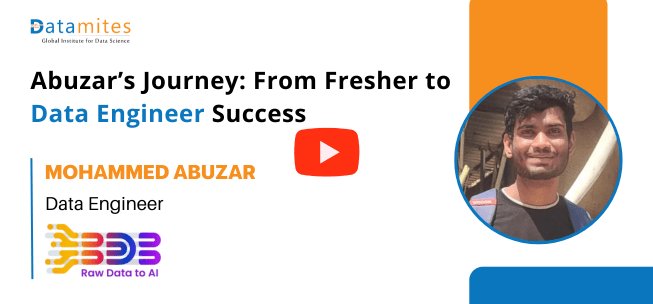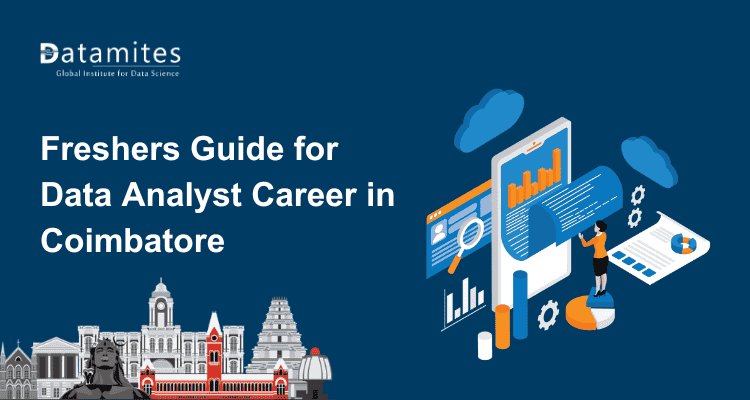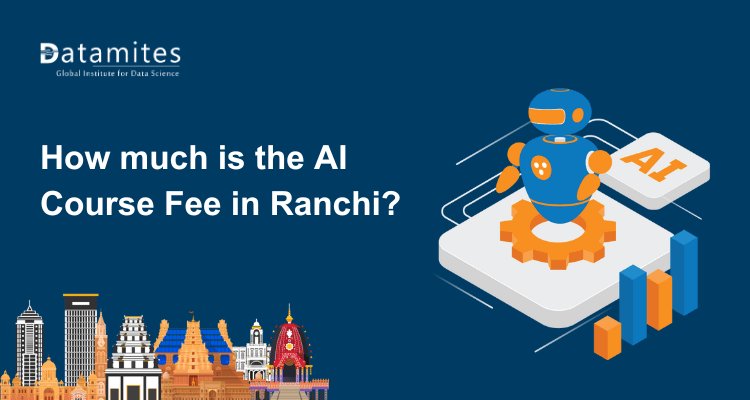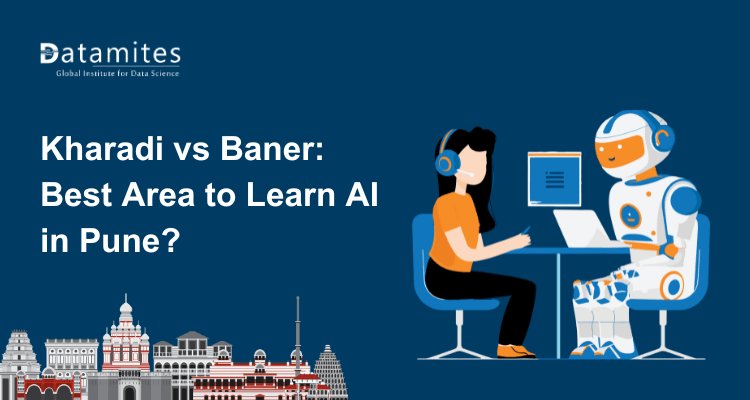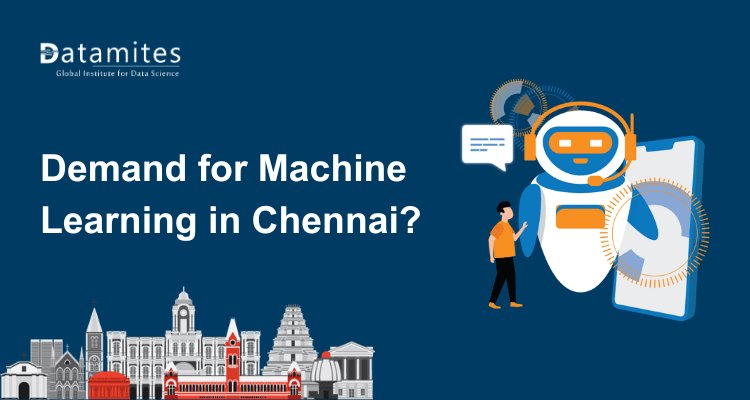Abuzar’s Journey: From Fresher to Data Engineer Success
Abuzar’s journey from a fresher to a data engineer shows how dedication and structured learning can shape success. With mentorship and practical projects, he turned challenges into career milestones.
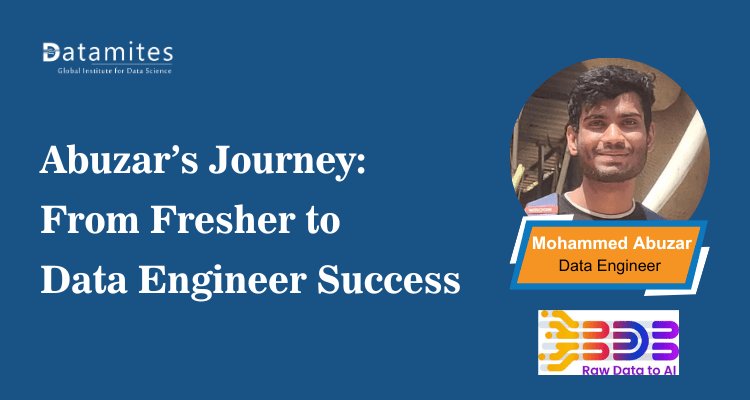
Mohamad Abuzar’s journey shows how curiosity, persistence, and hands-on learning can transform challenges into career opportunities. Coming from a Mechanical Engineering background, he initially faced the difficulty of coding and understanding data concepts. However, his structured training at DataMites, combined with guidance from mentors, helped him gain confidence in Python, SQL, and data engineering tools. Through projects like healthcare data analysis and customer spending analytics, he applied theoretical knowledge to real-world scenarios, building both skills and experience.
Starting with offline classes in Bangalore, completing multiple mock interviews, and tailoring his resume to match industry requirements, Mohamad successfully landed an internship at a BDB.AI company in Bangalore. His story demonstrates that consistent effort, mentorship, and practical exposure can bridge the gap from a non-technical background to a promising career in data engineering. Aspiring data professionals can look to Mohamad’s path as a testament to dedication, learning, and structured growth in the data field, making it an inspiring DataMites success story.
From Mechanical Engineering to Data Engineer: Mohamad Abuzar’s DataMites Journey
This Q&A highlights Mohamad Abuzar’s journey from Mechanical Engineering to Data Engineer, covering his learning, projects, mock interviews, and placement at DataMites.
Q1. Could you tell us a little about yourself and your academic background?
I am Mohamad Abuzar, a 2024 graduate in Mechanical Engineering from Dr. Ambedkar Institute of Technology. Soon after completing my degree, I decided to pursue a career in the field of data because of my growing interest in analytics and the potential it holds.
Q2. What motivated you to move from Mechanical Engineering to Data Engineering?
I was curious about the possibilities in the data field. A friend told me that data roles often require minimal coding compared to other software careers, which initially encouraged me. Over time, my genuine interest in understanding data and problem-solving drove me to pursue a formal program.
Q3. What program did you pursue at DataMites?
I enrolled in the Certified Data Engineer Analyst program in September 2024. The program started with fundamentals like Python and SQL before moving on to advanced tools and real-world projects.
Q4. How did your trainers guide you through the learning process?
The trainers at DataMites were instrumental in simplifying complex concepts. They patiently guided me through coding challenges, SQL queries, and the various tools used in the data engineering field, making the learning process much more approachable and effective.
Q5. What were the major projects you worked on during training?
I completed two projects during my course:
- Healthcare Data Analysis
- Customer Spending Analysis using PySpark
These projects gave me practical exposure to data engineering concepts and pipelines.
Q6. Did you face challenges while transitioning from a non-background?
Yes, definitely. Coding in Python was difficult in the beginning. Coming from a mechanical background, it took time to adapt. However, with guidance and consistent practice, I gradually became comfortable with SQL, pipelines, and other tools.
Q7. How important were mock interviews in your journey?
Mock interviews were crucial. I took four rounds of mock interviews at DataMites. Although I didn’t clear the first three, the feedback I received after each session helped me identify gaps and improve my performance. I finally cleared in the fourth attempt, which built my confidence for actual interviews.
Q8. What kind of interview questions did you face during placements?
Most of the questions revolved around SQL, data pipelines, and project work. For example, I was asked to explain my healthcare data analysis project, the challenges I faced, and how I solved them.
Q9. Did your self-practice projects also help in interviews?
Yes. Apart from institute projects, I worked on two additional projects using YouTube tutorials. These self-initiated projects impressed interviewers and gave me more confidence to discuss technical solutions.
Q10. Was your placement support experience smooth with DataMites?
Yes, very much. The Placement Assistance Team (PAT) guided me in resume building, tailoring my resume to match specific job descriptions, and preparing for AWS and storage-related requirements. They also scheduled interviews and gave constant support until I got placed.
Q11. What external resources did you use for preparation?
Apart from the DataMites training material, I used YouTube extensively. Whenever I had doubts in Python or SQL, I searched for tutorials and interview-specific content online.
Q12. How should students mention projects in their resumes?
Projects should be described briefly but effectively. In my case, I wrote:
- What the project was about
- The challenges I faced
- The purpose and outcomes of the project
- A short conclusion
This helped interviewers understand my work without overwhelming them with details.
Q13. Where do you see yourself five years from now?
Five years down the line, I see myself as a senior data engineer, leading projects and mentoring freshers entering this field. My goal is to grow both technically and as a team leader.
Refer to these articles:
- Nirmal Vani’s Journey to Success in Data Science
- Apoorva’s Journey from Fresher to Data Engineer
- Athulya’s Journey: From SEO Analyst to Data Engineer
Key Highlights from Mohamad Abuzar’s Data Engineering Journey
Mohamad Abuzar’s story demonstrates how structured training, practical projects, and persistent effort can help transition from a non-technical background into a successful data engineering career.
- A structured program like DataMites Certified Data Engineer Analyst helps build foundational skills in Python, SQL, and data engineering tools.
- Hands-on projects such as Healthcare Data Analysis and Customer Spending Analytics provide real-world problem-solving experience.
- Initial challenges with coding and adapting to technical concepts can be overcome with consistent practice and mentor guidance.
- Mock interviews and continuous feedback are essential for improving performance and interview readiness.
- Tailoring the resume according to job descriptions (e.g., AWS S3, Blob Storage) improves placement opportunities.
- Understanding and explaining projects in detail is critical during interviews; practical experience carries more weight than theoretical knowledge.
- Exposure to data pipelines, SQL-based analytics, and cloud storage concepts strengthens employability in data engineering roles.
- Offline training and in-person mentorship provide added clarity for complex concepts and tools.
- Independent learning, such as using YouTube tutorials, complements structured training and helps clarify doubts.
- Gaining an internship in a relevant BDB.AI company, like Mohamad did in Bangalore, offers hands-on exposure to professional data engineering workflows.
- Setting long-term goals, such as leading projects and guiding teams, helps shape a sustainable career path.
- Persistence, structured learning, and applied knowledge are key to successfully transitioning from a non-technical background into data engineering.
Refer to these articles:
- How to Become a Data Scientist in Hyderabad?
- Data Science Course Fee in Hyderabad
- How to Become a Data Scientist in Ahmedabad?
- Why Data Scientist Career in Ahmedabad
Mohamad Abuzar’s journey shows that breaking into data engineering isn’t just about interest; it requires structured learning, hands-on practice, and persistence. Coming from a Mechanical Engineering background, he initially faced challenges with coding and adapting to technical concepts. However, his dedication to learning, coupled with practical projects and mentorship at DataMites, enabled him to overcome these hurdles and transition confidently into the data engineering field. His story highlights how a non-technical background can be bridged with the right guidance, real-world experience, and consistent effort, making data engineering one of the top IT courses to pursue for career transformation.
For aspiring data engineers like Mohamad, now is the ideal time to upskill. Demand for skilled professionals continues to rise, especially through data science training in Ahmedabad, Bangalore, Pune, Hyderabad, Chennai, Mumbai, and Delhi. According to Fortune Business Insights, the global data science platform market is projected to grow from USD 103.93 B in 2023 to USD 776.86 B by 2032 at a CAGR of 24.7%. Structured programs with practical projects and placement support help students gain the skills and confidence needed to succeed.
DataMites Institute, a trusted name in Data Science, Data Engineering, AI, Machine Learning, Python Development, and Data Analytics training. With accreditations from IABAC and NASSCOM FutureSkills, DataMites provided him with expert-led sessions, hands-on projects, mock interviews, and career guidance, enabling a smooth transition into the data engineering domain.
With offline, online, and flexible learning options, including data science courses in Hyderabad, Bangalore, Kolkata, Chennai, Pune, Ahmedabad, and Mumbai, Mohamad was able to pick a format that matched his schedule and learning preferences. Regardless of his original background in Mechanical Engineering, the industry-aligned curriculum and expert mentorship at DataMites empowered him to secure an internship and carve out a growing career in the data engineering domain.
